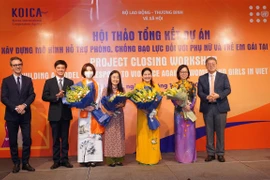The centre is part of the efforts within the framework of the cooperation between the Ministry of Labour, Invalids and Social Affairs (MoLISA) and the United Nations Population Fund (UNFPA) in Vietnam to reduce gender-based violence and especially violence against women and girls, under a project on mitigating the impact of the COVID-19 on vulnerable groups and ensuring the implementation of sustainable development goals (SDGs) in Vietnam funded by the Japanese government.
Ngoi nha Anh Duong provides integrated, essential and comprehensive services to people suffering from gender-based violence, including health, social, justice and protection services.
Earlier, the first of its kind was set up in the northern province of Quang Ninh with collaboration between MoLISA, the Korea International Cooperation Agency (KOICA), and UNFPA Vietnam. Since beginning operations in April 2020, the centre in Quang Ninh has become a safe haven for more than 300 women and children who are victims of gender-based violence. The centre’s hotline receives more than 1,000 calls per month.
Two more similar centres, which will be funded by the Japanese government, are expected to be set up in Ho Chi Minh City and Da Nang in the first quarter of 2022.
In Thanh Hoa, the centre has set up a free-of-charge hotline 18001744 operating 24/7 to receive and provide psychological counselling services, and connect support resources for victims of gender-based violence.
Speaking at the launching ceremony, MoLISA Deputy Minister Nguyen Thi Ha said that Ngoi nha Anh Duong plays an important role not only in supporting victims of violence but also in enhancing the engagement, responsibility and coordination among relevant departments, sectors and organisations in dealing with gender-based violence in a professional and friendly manner, through the application of a victim-centred approach method.
“The building and piloting of the one-stop service centre to support victims of gender-based violence following international standards will be a basis for relevant Vietnamese authorities to study and consult the building of documents specifying standards to be uniformly applied to units providing support services for violence victims,” Ha said.
Naomi Kitahara, UNFPA Chief Representative in Vietnam, said that her organisation is honoured to contribute to the Vietnamese Government’s efforts in preventing gender-based violence against women and girls.
The centre in Thanh Hoa aims to ensure that all women and girls in Vietnam, including the most vulnerable, have the right to live a life without violence and harm to dignity, she stressed.
The Japanese Government appreciated the tireless efforts by the UNFPA and the MoLISA in preventing and dealing with violence against women and girls in Vietnam, especially in the context of the COVID-19 pandemic.
Through funding the establishment of Ngoi nha Anh Duong in Thanh Hoa, the government contributed to reducing the negative impacts of the pandemic on the Southeast Asian nation.
The 2019 national study on violence against women in Vietnam found that two out of three Vietnamese women (63 percent) live with physical, sexual, emotional, economic and behavioural abuse from husbands or partners. Over 90 percent of women suffering from physical and sexual abuse from husbands do not seek any support from authorities. Economic loss caused by violence against women accounted for 1.81 percent of the country’s gross domestic product
Approved by the Prime Minister in late 2021, a programme on gender-based violence prevention and response set a target that by 2025, at least 50 percent of gender-based violence victims will receive support from service suppliers and all having demand will be assisted in various forms./.





























